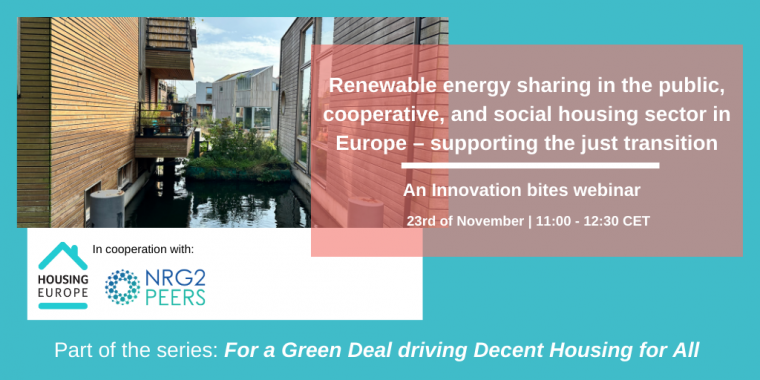Renewable energy sharing in the public, cooperative, and social housing sector in Europe – supporting the just transition
An 'Innovation bites' webinar
Online, 23 November 2023Save the date
Housing Europe is happy to announce its new series of webinars – Innovation bites – bringing forward innovation projects, with a focus on policy and funding. First episode: how can energy communities be integrated in social housing.
This first online session will focus on how Housing Europe members became motivated in recent years to play a more active role in the just transition, including by working to develop renewable energy communities with their neighbours. However, despite the fact that the updated Renewable Energy Directive (RED II) was passed in 2018, and has been binding for all member States since June 2021, progress by housing providers in most Member States has been slow or even non-existent.
The RED II was ambitious in terms of facilitating the establishment of renewable energy communities (RECs). However, in practice the transposition of the Directive into national law has made it difficult for housing providers to establish RECs with their tenants and residents. Even where the RED II has been transposed fully, the complexity involved in setting up a REC involving social tenants means that the housing providers simply lack the time and resources to set up such projects.
Programme
11:00 – 11:10 | Introduction to the session & the NRG2peers project - Tim Wolters, Housing Europe
11:10 – 11:25 | The approach in French social housing - Carine Puyol, L’Union sociale pour l’habitat
11:25 – 11:40 | The Swedish cooperative approach - Mikael Rosén, HSB Riksförbund
11:40 – 12:10 | Reaction & Presentation of the Position of the European Commission - Achille Hannoset, DG ENER
12:10 – 12:20 | Reaction & Discussion of how energy communities can better work with Housing Europe members - Heleen Schockaert, REScoop.eu
12:20 – 12:30 | Reaction & Overview of HE Policy Asks - Julien Dijol, Housing Europe
12:30 | Closing
The Q&A section will be open all throughout the session.
Register now to save your spot!
Innovation bites webinars - part of the series on 'For a Green Deal driving Decent Housing for All'
We need more innovative answers, that would not only prepare the places where we live to be more adapted to the environment, but also to do so without leaving anyone behind.The good news is that many interesting ideas are being tested out there. However, it is paramount that these ideas and their results are put forward, to inspire and eventually encourage scaling up. In our series, we have chosen four projects:
- The European Affordable Housing Consortium, SHAPE-EU, has as a mission to support renovation at district level
- NRG2PEERS is focused on improving the creation of energy communities
- Drive-0 aims to accelerate deep renovation, prioritising circular solutions in a cost effective manner
- syn.ikia’s goal is to prove that the neighbourhood approach is the best when wanting to ensure energy efficiency without compromising the well-being of the residents.
A project is not an isolated environment, its goals are set to respond to existing issues, and its results are meant to inspire solutions. The development of demonstration cases can serve as testbeds for different types of funding and financing, while lessons learned from a project could deliver solid arguments for new or improved policies.
The EU Green Deal must not leave anyone behind. Now is the time to set the right priorities at political level. We must adapt new and renovated homes to climate change and social needs. It is generally agreed that housing should be a right. But housing without affordable means to light, heat, cool, cook - is not decent housing. To achieve this goal, a unified European Housing Plan should be launched, that could harmonise all existing tools, and mobilise the necessary resources for a responsible Renovation Wave. One of its reference point is the European Affordable Housing Initiative, a valuable source of knowledge.
With the right plan, social and affordable housing providers in Europe could commit to delivering over 200,000 new homes annually emitting lowest carbon per m2 possible. People expect more than a few more centimetres of insulation and a couple of solar panels. They would be on board with the goals of the green deal if it makes homes energy-saving, at a price they can pay.